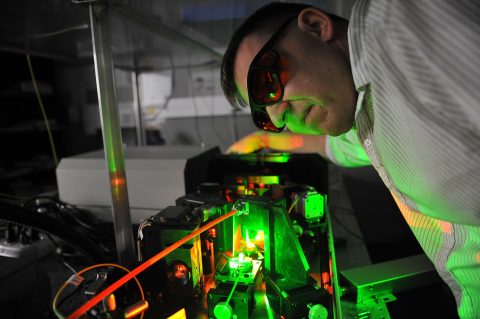Biophysics (Minor)
Why study Biophysics?
Imagine being able to reverse-engineer nature itself. By taking a mathematics-based approach to understanding biological systems, you will begin to grasp the complex mechanisms at work in nature and create models that predict the results of using the same processes towards other goals. Applying the laws of physics to biological phenomena has generated learning that allowed for the development of medical imaging technology and radiation therapy, to name just two examples of the enormous potential of this field for solving some of the most pressing problems facing society.
At the intersection of multiple disciplines (not only biology and physics, but also chemistry and mathematics), biophysics will empower you to see links between things you didn’t know were connected. The whole world will be open to you, since biophysicists study nature at every level, from atoms and molecules to cells, organisms and entire environments.
The minor is intended for non-Physics students. If you plan to pursue a Specialization or the Honours program in Physics, you’ll have the option of choosing a focus on Biophysics.
Special funding for out-of-province students
Up to $4000 for undergraduate programs.
Program structure
Program options
- Minor in Biophysics (24 credits)
The minor must be combined with an honours, specialization or major program.
Courses
United States students: A U.S. Federal Student Aid-eligible version of this program is offered. This version meets all U.S. regulations (such as no co-operative education or e-courses) for eligible programs.
Admission criteria
Minimum cut-off averages and course requirements
- Quebec CEGEP: 23
- Calculus 1 and Calculus 2 and Linear Algebra – Mechanics, Electricity and Magnetism and Wave, Optics and Modern Physics – General Chemistry and Chemistry of Solutions – General Biology OR Natural Science DEC OR DEC intégré en sciences, lettres et arts.
- Additional information for CEGEP applicants
- High School: C+ overall, C+ in math / sciences
- Completed courses in the disciplines of Calculus, Biology, Chemistry and Physics.
- One math from Pre-Calculus, Calculus, or equivalent
- Two sciences (from Biology, Chemistry or Physics)
- ACT or SAT is NOT required
- Canadian curricula course requirements
- Accepted international qualifications
- Completed courses in the disciplines of Calculus, Biology, Chemistry and Physics.
- International Baccalaureate (IB) diploma: 26 overall 4 math, 4 science
- one math (Applications and Interpretations HL, Analysis and Approaches HL or Analysis and Approaches SL)
- one science (Physics, Chemistry or Biology, either SL or HL)
- International Baccalaureate Career-related Programme (CP): 4.3/7 overall 4 math, 4 science
- one math (Applications and Interpretations HL, Analysis and Approaches HL or Analysis and Approaches SL)
- one science (Physics, Chemistry or Biology, either SL or HL)
- Additional Career-related Programme (CP) course requirements
- Baccalauréat français: 11 overall, 11 in math / science
- Première: Spécialité mathématiques AND Spécialité physique-chimie
Terminale: Spécialité mathématiques (also accepted, Spécialité Physique-Chimie AND Mathématiques Complémentaires)
- Première: Spécialité mathématiques AND Spécialité physique-chimie
- British system of education (GCE):
- A-levels: At least two A-level exams CD, C in math, D in science or
- AS-levels: At least 4 AS-level exams with equivalent results or
- BTEC: Level 3 Diploma or Extended Diploma in a related subject area with equivalent results
- Students without math or science A-levels may be admissible based on AS-level or iGCSE/GCSE/O-Level exam results. Students should include all their exam results from iGCSE (or equivalent) onwards to support their application.
- Additional information for British System of Education (GCE) applicants
- University Transfers (internal/external): C overall, C in math / sciences
- Completed courses in the disciplines of Calculus, Biology, Chemistry and Physics.
Minimum cut-off averages should be used as indicators. The cut-off data may change depending on the applicant pool. Applicants who meet the stated minimum requirements are not guaranteed admission to these programs.
Application deadlines

FALL ENTRY (September)
Deadline: March 1
U.S. and international applicants: Apply no later than February 1 to allow time for immigration document processing. However, applying earlier is strongly recommended. Immigration processing times vary by country and delays could prevent you from starting your studies on time.

WINTER ENTRY (January)
Deadline: November 1
U.S. and international applicants: Apply no later than August 1 to allow time for immigration document processing. However, applying earlier is strongly recommended. Immigration processing times vary by country and delays could prevent you from starting your studies on time.
We reserve the right to close admission to a program at any time after the official deadline without prior notice.
After your degree
Thanks to Concordia's emphasis on taking an interdisciplinary approach to your field of study, you'll graduate with a depth of knowledge informed by an understanding of how your subject connects to the wider world. You'll be ideally positioned to succeed in a professional role that demands rigorous analytical thinking, sharp communication skills and the ability to approach problem-solving from multiple dimensions.
Other programs of interest

Today physicists build lasers, design medical imaging machines and develop applications for nanotechnology.
Department
Faculty

